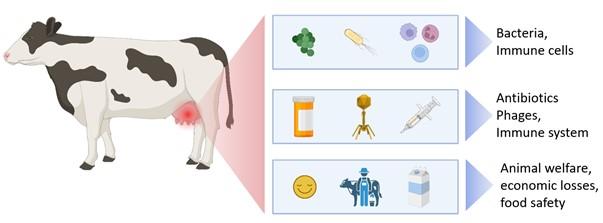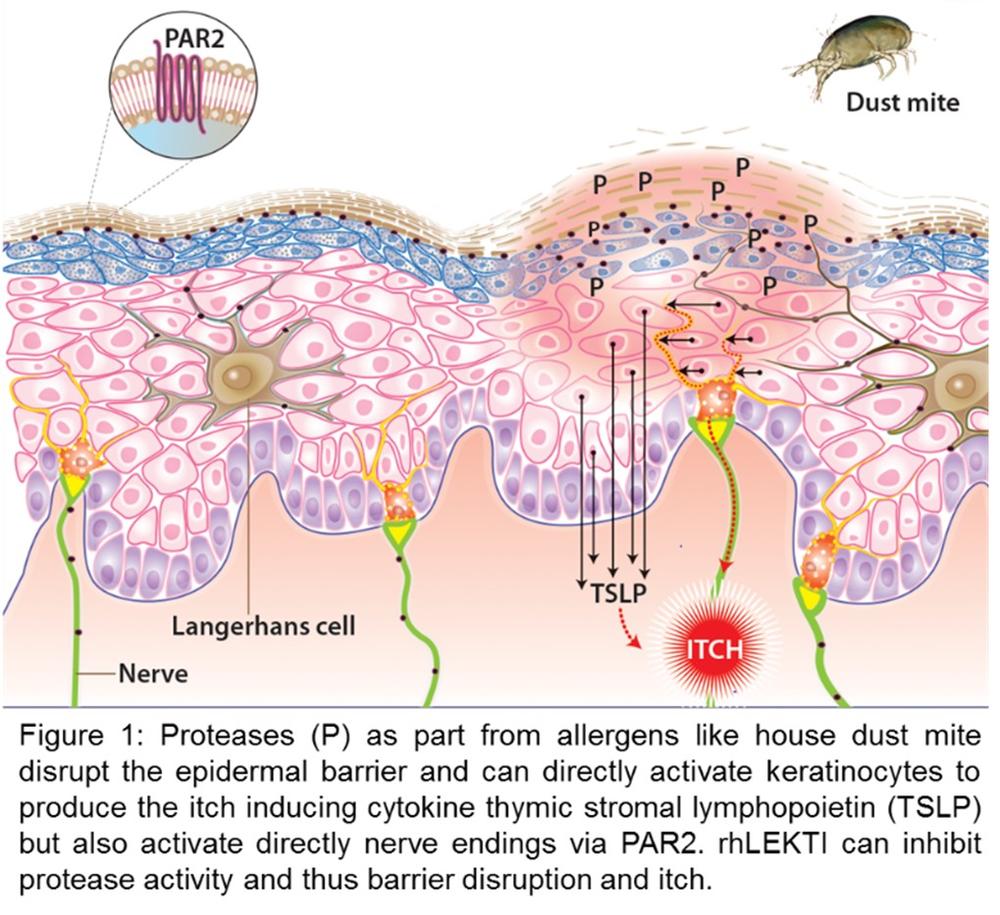AG Bäumer
Arbeitsgruppe Prof. Bäumer
One research focus is in the field of immunopharmacology related to allergic skin diseases like atopic dermatitis and its related itch. Atopic dermatitis is a common skin disease in humans as well as in dogs and particularly the chronic disease is still a treatment challenge.
Recently, our group has investigated the potential benefits of LEKTI in the context of atopic dermatitis and sensory perception.
LEKTI (lympho-epithelial Kazal-type related inhibitor) is a broad-acting protease inhibitor with 15 domains, which is cleaved into active domains in the outermost skin layer. Data from our laboratory suggest that topical administration of LEKTI domain 6 has inhibitory effects on cells crucially involved in barrier disruption (keratinocytes) and itch perception (dorsal root ganglia cells).
There is a significant correlation between reduced transcriptional expression of SPINK5 (the gene encoding LEKTI) and atopic dermatitis in humans. Patients with Netherton's syndrome, characterized by loss-of-function mutations in SPINK5, often exhibit inflammatory skin lesions, severe itch, and atopic sensitization.
In addition to the in vitro findings on reconstructed skin and sensory neurons, our research also demonstrated the anti-inflammatory potential of LEKTI domain 6 in a translational mouse model of atopic dermatitis, specifically the NC/Nga mouse model (Canbolat et al., 2024).
Dendritic cells, as the primary professional antigen-presenting cells, have been a focal point of our research for some time. A recent project delved into the potential role of dendritic cells migrating into the dorsal root ganglia during skin sensitization with allergens in the context of peripheral sensitization. Peripheral sensitization refers to a condition where the threshold to sense pruritus (itch) is greatly reduced. Tichakorn Singto successfully demonstrated an increase in dendritic cell migration and heightened susceptibility of sensory neurons under allergic skin conditions (Singto et al., 2024).
Of note, Tichakorn Singto also observed an upregulation of a transporter for sphingosine-1-phosphate (S1P) in dendritic cells, a signaling peptide crucial for controlling inflammation and itch under allergic conditions (Kleuser & Bäumer, 2023).
Bacteriophages to treat pyoderma and otitis externa
More recently, our research group has explored novel therapeutic options for skin infections such as pyoderma and otitis externa in dogs, induced by bacteria like Pseudomonas aeruginosa and Staphylococcus pseudintermedius (Bäumer et al., 2020). One approach involves the use of strain-selective bacteriophages, which are viruses that selectively kill certain bacteria without harming mammalian cells or other bacteria within the normal skin microbiome. Initial experiments targeting P. aeruginosa in otitis contexts have shown promising results (Dalponte et al., 2023), with first clinical trials currently underway. Antimicrobial resistance (AMR) is considered one of the most important public health issues because it is one of the main reasons for the failure to treat bacterial infections. The use of antimicrobial agents, in particular their inappropriate use, is considered to be one of the main causes of the selection of antibiotic-resistant bacteria. In addition to research into alternative therapies to antibiotics, responsible and rational use is therefore one of the most important strategies for combating antibiotic resistance in both human and veterinary medicine. For this reason, we are also concerned with the consequences of the amendment to the legislation regulating the details of dispensing medicines (Moerer et al., 2023) and are investigating the effects of the new Regulation (EU) 2019/6 on veterinary medicinal products.
Here you can see a short clip about our research on bacteriophages (in German, Bakteriophagen).
Isolated udder/PCBUS
Mastitis is one of the most important diseases in dairy cattle worldwide. Consequently, mastitis infections represent a primary driver for antibiotic use on dairy farms, rendering the disease a concern from stable to table. Beyond the animal's distress and discomfort, the substantial economic losses incurred by producers and the escalating antibiotic resistance underscore the urgency for research. The disease's pathophysiology remains incompletely understood, with the immune system's role remaining ambiguous. Given these challenges, there is a pressing need for innovative treatment approaches to mitigate the global repercussions of udder infections, spanning from animal welfare to consumer safety. Adhering to the principles of the 3Rs concept (reduce, replace, refine), it's imperative to leverage innovative and complementary in vitro models to address scientific inquiries. To this end, we employ the isolated perfused bovine udder and precision-cut bovine udder slices (PCBUS) models. Through the isolated perfused bovine udder, an artificial infection can be induced, facilitating the study of intracisternal application of test compounds and their impact on infected glandular tissue (Brand et al., 2021). The PCBUS model enables the investigation of infection and subsequent intervention within a 5-day timeframe (Filor et al., 2021, 2022). Our research focus lies in exploring bacteriophages as a novel treatment modality and elucidating the immune system's role to facilitate pharmacological intervention.

Selected publications
Bäumer W, Jacobs M, Tamamoto-Mochizuki C. Efficacy study of a topical treatment with a plant extract with antibiofilm activities using an in vivo model of canine superficial pyoderma. Vet Dermatol. 2020 Apr;31(2):86-89.
Brand KS, Filor V, Bäumer W. Early inflammatory events of mastitis-a pilot study with the isolated perfused bovine udder. BMC Vet Res. 2021 Nov 19;17(1):356. doi: 10.1186/s12917-021-03029-y. PMID: 34798884; PMCID: PMC8603483.
Canbolat P, Wilzopolski J, Kaessmeyer S, Filor V, Vidak J, Rüger M, Mägert HJ, Forssmann WG, Bäumer W, LEKTI domain 6 displays anti-inflammatory action in vitro and in a murine atopic dermatitis model, Journal of Dermatological Science, in press, DOI: https://doi.org/10.1016/j.jdermsci.2024.03.004
Dalponte A, Filor, Fulde M, Alter T, Müsken M, Bäumer W. Bacteriophage therapy against P. aeruginosa induced canine otitis externa. Journal of Veterinary Pharmacology and Therapeutics 2023; 46: 74-74.
Filor V, Petry M, Meißner J, Kietzmann M. Precision-cut bovine udder slices (PCBUS) as an in-vitro-model of an early phase of infection of bovine mastitis. BMC Vet Res. 2021 Mar 16;17(1):120. doi: 10.1186/s12917-021-02817-w. PMID: 33726750; PMCID: PMC7962284.
Filor V, Seeger B, de Buhr N, von Köckritz-Blickwede M, Kietzmann M, Oltmanns H, Meißner J. Investigation of the pathophysiology of bacterial mastitis using precision-cut bovine udder slices. J Dairy Sci. 2022 Sep;105(9):7705-7718. doi: 10.3168/jds.2021-21533. Epub 2022 Jul 22. PMID: 35879165.
Kleuser B, Bäumer W. Sphingosine 1-Phosphate as Essential Signaling Molecule in Inflammatory Skin Diseases. Int J Mol Sci. 2023 Jan 11;24(2):1456. doi: 10.3390/ijms24021456.
Moerer M, Lübke-Becker A, Bethe A, Merle R, Bäumer W. Occurrence of Antimicrobial Resistance in Canine and Feline Bacterial Pathogens in Germany under the Impact of the TÄHAV Amendment in 2018. Antibiotics (Basel). 2023 Jul 15;12(7):1193. doi: 10.3390/antibiotics12071193. PMID: 37508289; PMCID: PMC10376885.
Singto T, Filor V, Vidak J, Klopfleisch R, Bäumer W. Dendritic cells under allergic condition enhance the activation of pruritogen-responsive neurons via inducing itch receptors in a co-culture study. BMC Immunol. 2024 Feb 12;25(1):17.
